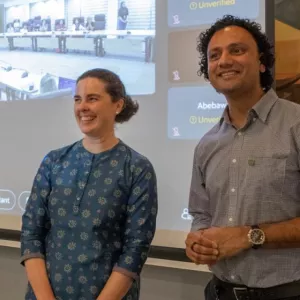How digging into root science can help crops grow in dry conditions
LOS BAÑOS, Philippines (6 November 2024) —The importance of roots in plant growth is often overlooked or misunderstood. However, rice roots have a distinct anatomy and architecture, making them fascinating to study. Dr. Amelia Henry, Senior Scientist II at the International Rice Research Institute (IRRI), and her team are helping shed light on the understudied science of roots, particularly in

How digging into root science can help crops grow in dry conditions
LOS BAÑOS, Philippines (6 November 2024) —The importance of roots in plant growth is often overlooked or misunderstood. However, rice roots have a distinct anatomy and architecture, making them fascinating to study. Dr. Amelia Henry, Senior Scientist II at the International Rice Research Institute (IRRI), and her team are helping shed light on the understudied science of roots, particularly in rice.
Her work has been recognized for this year’s Dundee Root Medal, given by the International Society of Root Research (ISRR) for her “outstanding contribution to the field of root research.”
Dr. Henry also delivered the Dundee Medal Lecture “Integrated root phenotypes for dry direct-seeded rice.” In her lecture, she emphasized the range of root trait combinations characterized under direct seeding in the IRRI elite breeding pool and the large variation in root and shoot growth observed across partner sites.
A long legacy of root research at IRRI
Although IRRI is well known for its key role in the Green Revolution, its Genebank, or the novel crop management techniques it has developed, there is also a long legacy of root research at IRRI. For decades, the International Rice Research Institute (IRRI) has studied how rice roots can help crops survive and thrive in dry conditions. In the 1960s, scientists focused on how different root structures might help rice plants access more water from the soil during drought. By the mid-1970s, IRRI researchers applied different methods to measure root growth and how they could grow deep to reach underground water sources. They even created tools to “pull” roots, measuring their strength to understand how well they could withstand drought.
In the 1980s, scientists at IRRI…

